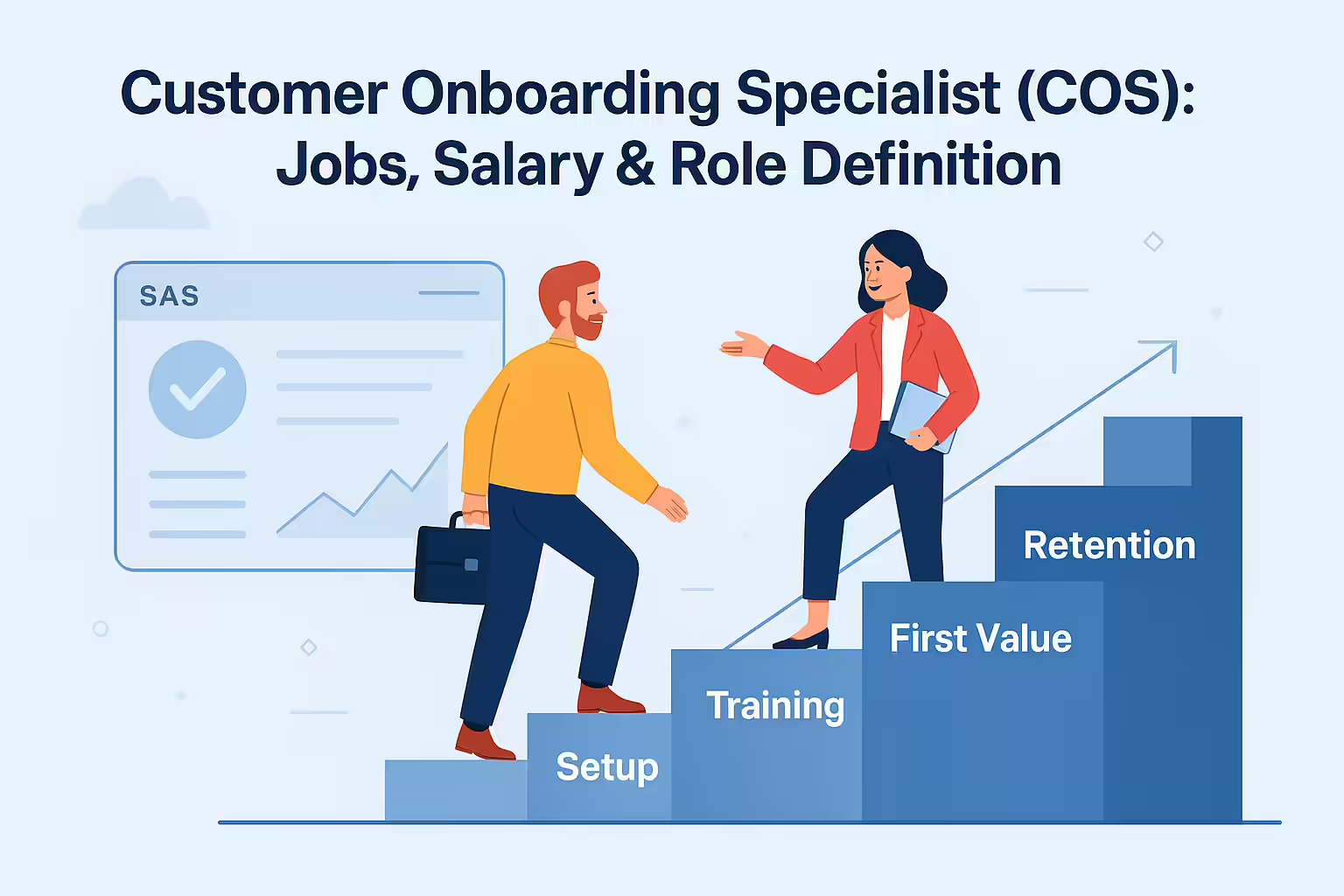What Is a Customer Onboarding Specialist? The Complete 2025 Guide
That first impression can make or break a customer relationship. In Software as a Service (SaaS), where long-term value is everything, the initial experience is paramount. This is where the Customer Onboarding Specialist becomes the most important person in a new customer’s journey.
This role is the architect of first impressions. They ensure customers don’t just sign up, but actually succeed. This guide explores everything about the Customer Onboarding Specialist role, from core responsibilities and essential skills to the massive impact they have on business growth.
What Does a Customer Onboarding Specialist Do?
A Customer Onboarding Specialist (COS) is a customer-facing professional who guides new clients through the setup, training, and adoption of a product. Their job is proactive—to clear roadblocks before they become problems and ensure customers achieve their goals right away.
This isn’t just another customer support role. It’s about creating a foundation for long-term success.
Primary Goals of an Onboarding Specialist
The work of a revenue operations specialist is driven by a few key objectives. This focus ensures that new customers are not just satisfied, but are actively set up for a profitable long-term relationship.
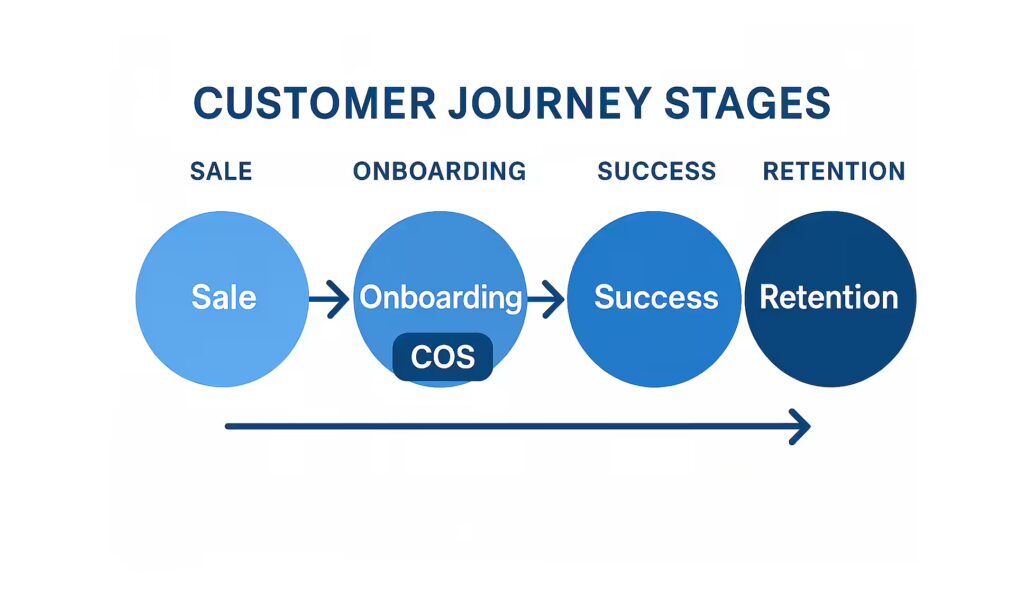
- Create a Seamless Experience: Make the first steps smooth, positive, and confidence-inspiring.
- Reduce Time-to-First-Value (TTFV): Help customers experience the “aha moment” as quickly as possible. This is directly linked to higher retention.
- Drive Product Adoption: Ensure customers actively use the features that are most relevant to their goals.
- Build for Long-Term Retention: A strong start builds confidence and lays the groundwork for customer loyalty.
Core Responsibilities of the Role
To achieve these goals, a Customer Onboarding Specialist handles a wide range of tasks. They are the customer’s primary guide during the crucial early stages of the relationship.
Here’s what their day-to-day work includes:
- Developing Deep Product Expertise: Becoming a master of the product to provide accurate, tailored guidance.
- Building Relationships: Initiating contact with welcome calls and personalized emails to build immediate rapport and trust.
- Understanding Customer Needs: Assessing each customer’s unique business objectives to create a personalized onboarding plan.
- Assisting with Setup and Implementation: Guiding customers through technical setup, account configuration, and software integrations.
- Educating and Training: Conducting product demos and training sessions focused on the features that matter most to the customer.
- Proactively Solving Problems: Identifying and removing technical glitches, knowledge gaps, or any other hurdles to success.
- Monitoring Progress: Using tools like a CRM to track milestones and check in regularly.
- Collecting and Relaying Feedback: Acting as the “boots on the ground” for the product team by channeling customer insights back to them.
Why Great Onboarding Is a Growth Engine
Effective customer onboarding isn’t just a nice-to-have; it’s a strategic imperative that directly fuels business growth. It’s the first and most critical step in the customer success journey, setting the stage for long-term loyalty.
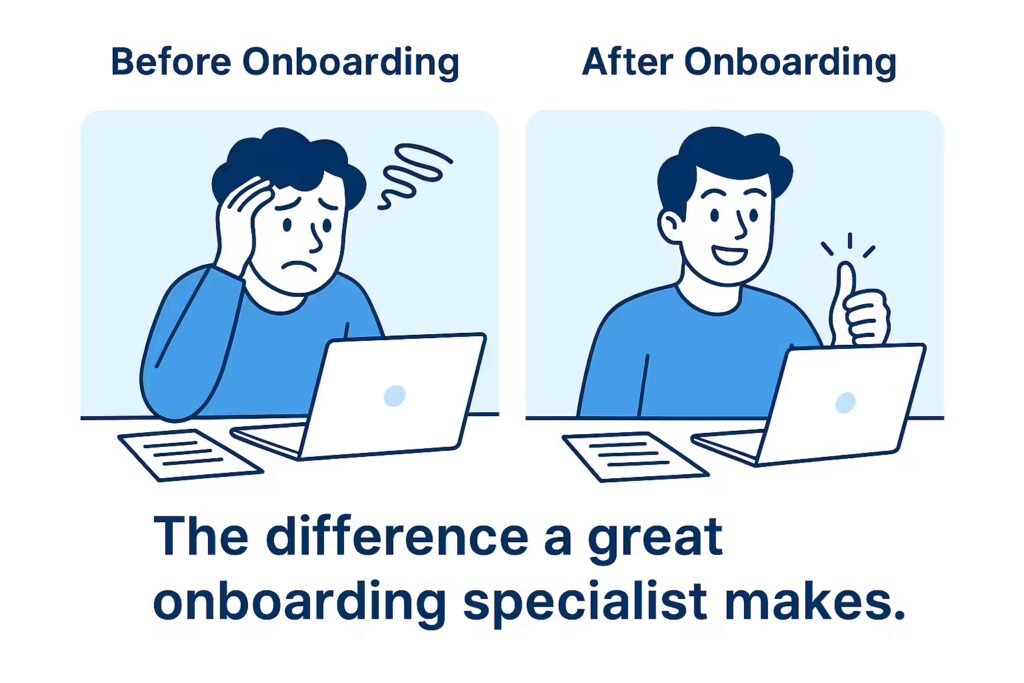
Boosts Customer Retention
The link between onboarding and retention is crystal clear. A bad first experience is a leading cause of churn, while a great one has a massive positive impact.
- Statistics show that 86% of customers are more likely to stay loyal if they receive welcoming and educational onboarding content.
- Poor onboarding is consistently ranked as one of the top reasons for customer churn.
- Acquiring a new customer can be five times more expensive than retaining an existing one, making effective onboarding a financial necessity.
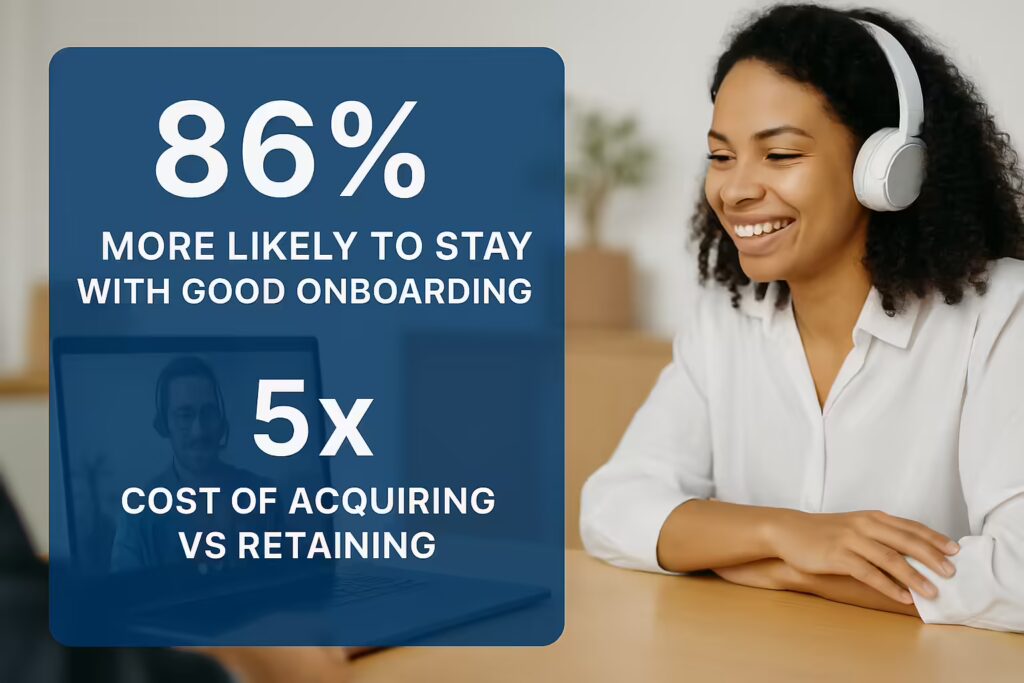
A smooth onboarding experience validates the customer’s purchase decision, builds their confidence, and secures their long-term commitment.
Increases Customer Lifetime Value (LTV)
Strong onboarding directly increases Customer Lifetime Value (LTV). When customers succeed early, they are more likely to:
- Integrate the product deeper into their workflows.
- Upgrade to premium plans.
- Explore additional features or services.
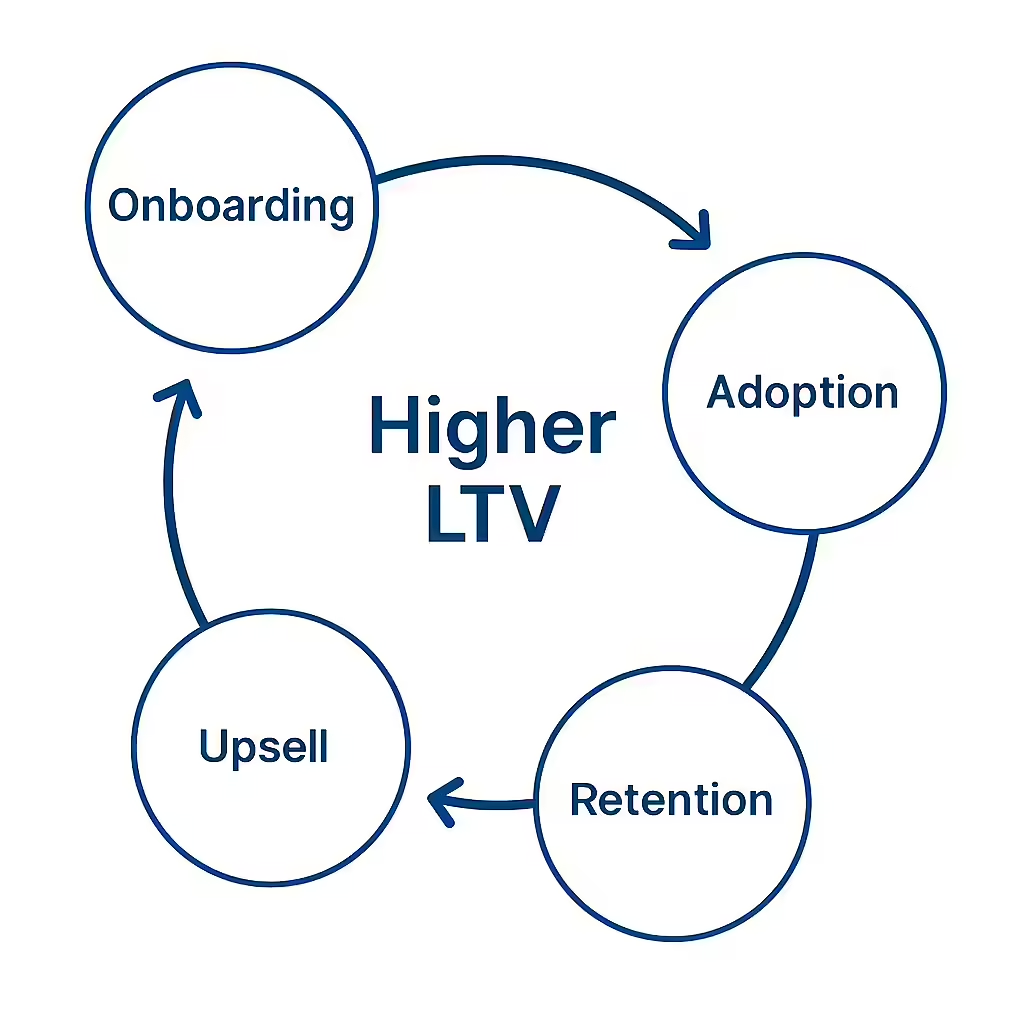
This creates a positive feedback loop: better onboarding leads to higher satisfaction, which drives retention and creates more opportunities for expansion revenue.
Reduces Long-Term Support Costs
When a revenue ops specialist proactively trains new users, it prevents common issues that would otherwise flood support channels. A well-onboarded customer understands how to use the product correctly, leading to fewer support tickets and lower operational costs.
Core Skills for RevOps Success
Excelling as a Customer Onboarding Specialist requires a unique mix of technical knowledge, project management skills, and emotional intelligence. It’s a role that needs someone who is both a people person and a product expert.
| Skill Category | Description | Why It's Crucial for Onboarding |
|---|---|---|
| Communication | Explaining complex topics simply, active listening, and building rapport. | Essential for training customers, understanding their needs, and setting clear expectations. |
| Empathy & EQ | Understanding the customer's perspective and responding with patience and tailored support. | Builds trust, de-escalates issues, and fosters a positive and personalized initial relationship. |
| Technical Proficiency | Deep product knowledge and the ability to guide setup, integration, and troubleshooting. | Necessary to solve technical problems, demonstrate value, and configure the product effectively. |
| Project Management | Organizing tasks, managing multiple client timelines, and tracking milestones. | Ensures a structured, efficient, and timely onboarding process for every customer. |
| Problem-Solving | Identifying root causes of issues, finding creative solutions, and navigating roadblocks. | Allows specialists to overcome unique challenges and continuously improve the onboarding process. |
The Onboarding Specialist’s Workflow & Toolkit
The daily life of an onboarding specialist blends a structured process with personalized interaction. They follow a clear plan but remain flexible to meet the unique needs of each customer.
Typical Onboarding Stages
- Post-Sale Handoff: Receiving detailed notes from the sales team about the customer’s goals and expectations.
- Initial Welcome: Making the first post-sale contact via a welcome call or email to set the tone and outline the process.
- Discovery & Goal Setting: Diving deep to confirm the customer’s specific objectives and priorities.
- Setup & Configuration: Guiding the user through account creation, data import, and technical setup.
- Product Training: Educating the customer on how to use the product effectively, focusing on features relevant to their goals.
- Milestone Tracking: Monitoring progress with regular check-ins to offer encouragement and support.
- Feedback Collection: Actively soliciting feedback to improve both the product and the onboarding process itself.
Tools Every Revenue Ops Analyst Should Know
To manage this process efficiently, specialists rely on a powerful tech stack.
- CRM Systems (e.g., HubSpot, Salesforce): The CRM is the central hub for all customer information, tracking everything from sales notes to onboarding progress.
- Communication Platforms (e.g., Kixie): Tools like Kixie are vital for managing calls and SMS messages, and are essential for efficient outreach. Key features include power dialing to connect with more customers faster and seamless CRM integration that automatically logs every interaction, saving valuable time.
- Project Management Software (e.g., Asana, Monday.com): These tools help organize tasks, manage timelines across multiple clients, and ensure no steps are missed.
- Digital Adoption Platforms (DAPs) (e.g., Userpilot, Pendo): DAPs allow specialists to create scalable, in-app guidance like interactive tours and checklists, empowering users to learn by doing.
Effective communication is the backbone of great onboarding. See how Kixie’s automated call logging can free up your team to focus on what matters: the customer.
How RevOps Aligns GTM Teams
A Customer Onboarding Specialist acts as a critical hub, connecting various departments to ensure a cohesive customer experience. Strong cross-functional collaboration is essential for success.
- Sales: A smooth handoff from Sales is crucial. The specialist needs all the details—goals, pain points, and promises made—to create a tailored plan.
- Customer Success: The COS sets the stage for the Customer Success Manager (CSM). A positive onboarding makes it far easier for the CSM to build long-term loyalty and drive retention.
- Product: The specialist provides an invaluable feedback loop to the Product team, sharing firsthand insights on where new users struggle and what they value most.
- Support: By identifying common issues during onboarding, the specialist can work with the Support team to address gaps in training or documentation before they become widespread problems.
Frequently Asked Questions (FAQ)
What is the main goal of a Customer Onboarding Specialist?
The main goal is to guide new customers to their first moment of value as quickly as possible. This involves ensuring they have a smooth initial experience, understand how to use the product to meet their goals, and are set up for long-term success.
Is a Customer Onboarding Specialist a sales role?
No, it is a post-sales role. While they work closely with the sales team, their focus is on customer adoption and success, not on closing deals. They take over after the sale is complete to ensure the customer successfully implements and uses the product.
What makes this role different from customer support?
Customer support is typically reactive, responding to issues as they arise. A Customer Onboarding Specialist is proactive. They anticipate needs, provide structured training, and guide customers along a predefined path to prevent problems from happening in the first place.
Build Better Relationships from Day One
The Customer Onboarding Specialist is an indispensable part of any modern SaaS business. They transform new buyers into loyal, successful users by architecting a flawless first impression. This role requires a powerful blend of technical skill, project management discipline, and genuine empathy.
By investing in skilled onboarding specialists and empowering them with the right tools, you are investing directly in the drivers of sustainable growth: higher retention, increased lifetime value, and a stronger brand.
Ready to empower your onboarding team?
Kixie’s powerful communication platform integrates seamlessly with your CRM, automating tedious tasks and giving your specialists more time to build lasting customer relationships.
Learn How Kixie Can Enhance Your GTM Efficiency Today

